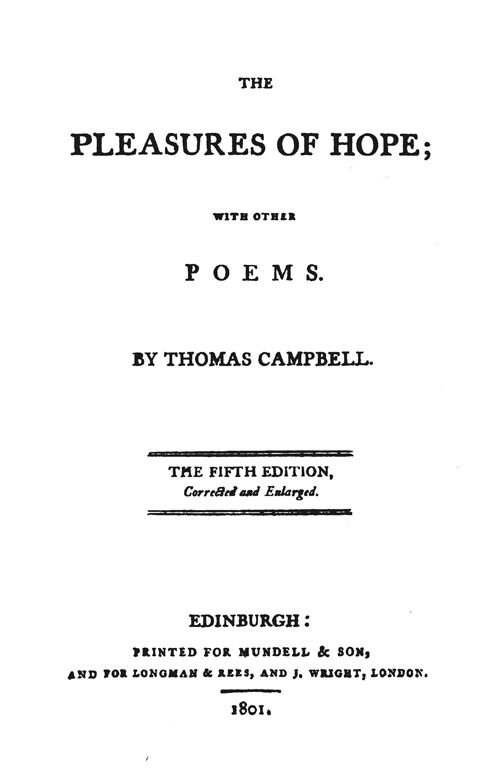Written on reading Campbell's “Pleasures of Hope.”
1805.
HOW seldom 'tis the Poet's happy lot
T' inspire his readers with the fire he wrote ;
To strike those chords that wake the latent thrill,
And wind the willing passions to his will.
Yes, CAMPBELL, [1] sure that happy lot is thine,
With fit expression,—rich from Nature's mine,—
Like old Timotheus, [2] skilful plac'd on high,
To rouse revenge, or soothe to sympathy.
Blest Bard ! who chose no paltry, local theme,
Kind Hope through wide creation is the same.
Yes, Afric's sons shall one day burst their chains, [3]
Will read thy lines, and bless thee for thy pains ;
Fame yet shall waft thy name to India's shore,
Where next to Brahma, [4] thee they will adore ;
And Hist'ry's page, exulting in thy praise,
Will proudly hand thee down to future days :
Detraction foil'd, reluctant quits her grip,
And carping Envy silent bites her lip.
These lines were first printed in 1805 in the Paisley Repository, No. II., edited by John Millar. The editor was born in the Townhead of Paisley. He was a bookbinder, bookseller, librarian, publisher, land measurer, teacher, and occasionally preacher to the Anabaptists. The Repository was commenced in 1805, and completed in 1811, in 24 Nos. without dates. It was most erratic in its appearance in Nos. and editions of its Nos. In 1809, he published a History of the Witches of Renfrewshire and a Songster. In 1812, he published The Paisley Annual Miscellany; and, in 1814, he left Paisley and became teacher of Giffen School, near Beith. By indomitable perseverance, he acquired a smattering of the ancient languages of Latin, Greek, and Hebrew, and the German modern language. In 1844, he published a new system of Arithmetic. He died at Greenhill, Giffen, en 25th November, 1854.—Ed.
[1] Thomas Campbell was born in the neighbouring city of Glasgow on 27th July, 1777. He was a distinguished poet and the most perfect lyrical writer of his time. His poem, “The Pleasures of Hope,” was published first in 1799, and reached the 7th edition in 1804. The piece contains a number of images full of force and interest, and breathes throughout the enthusiasm of the most generous sentiment. On Monday, 21st September, 1874, we met Mr. John Crawford, author of the “Philosophy of Wealth,” in Gilmour Street, Paisley, when he enquired how Tannahill was getting on (alluding to this present edition of the Poet's works), and we remarked, “exceedingly well,” and that we intended that evening writing the note to the “Ode to the ‘Pleasures of Hope.’ ” He observed it was a very pleasant subject; and the next moment, with an impulsive outburst of indignation, exclaimed that it was an eternal disgrace to the Liberal Town Council of Paisley to refuse the Freedom of the Burgh to Thomas Campbell. We concurred with Mr. Crawford in the “everlasting disgrace,” and instantly reminded him that the same Thomas Campbell, with all his generous sentiments, at Professor Wilson’s dinner, never referred to the lyric poet of Paisley, and that neither the Dinner Committee, their Secretary (Mr. Crawford himself), nor their guest, Professor Wilson, deigned to mention the name of Tannahill. Mr. Crawford's remark referred to the motion of Provost Farquharson, seconded by Baillie Drummond, at a meeting of the Town Council held on 9th August, 1836, that the “Freedom of the Town be conferred upon Thomas Campbell, Esquire, author of ‘The Pleasures of Hope,’ a poem, who was to visit this place in a few days,” which, after a vote, was negatived; and we referred to the Public Dinner to Professor Wilson on 11th August, 1836. Thomas Campbell died on 15th June, 1844, in the 67th year of his age; Professor Wilson was born on 18th May, 1785, and died 4th April, 1854, in his 69th year; and John Crawford, born on 10th May, 1802, died on 26th September, 1874, in the 73rd year of his age,—five days after our meeting.—Ed.
[2] Timotheus was one of the celebrated poet-musicians of antiquity, born at Miletus, 446 B.C. He added four additional strings to the Lyre, for which he was tried and sentenced to cut them off, and then to be banished; but before executing the first part of the sentence, he noticed an old statue with a Lyre of eleven strings, which was shown to the judges, and they recalled their sentence.—Ed.
[3] Slavery was abolished in the British Colonies on 28th August, 1833, and in the United States of America on lst January, 1863, when Afric's sons became freemen.—Ed.
[4] Brahma in Hindoo Mythology is the principal Deity,—the supposed creator of the world, the great father and ruler.—Ed.

The title page of the fifth edition. The first edition was published in 1799 in Edinburgh by Mundell & Son.—G.P.
[Semple 16]